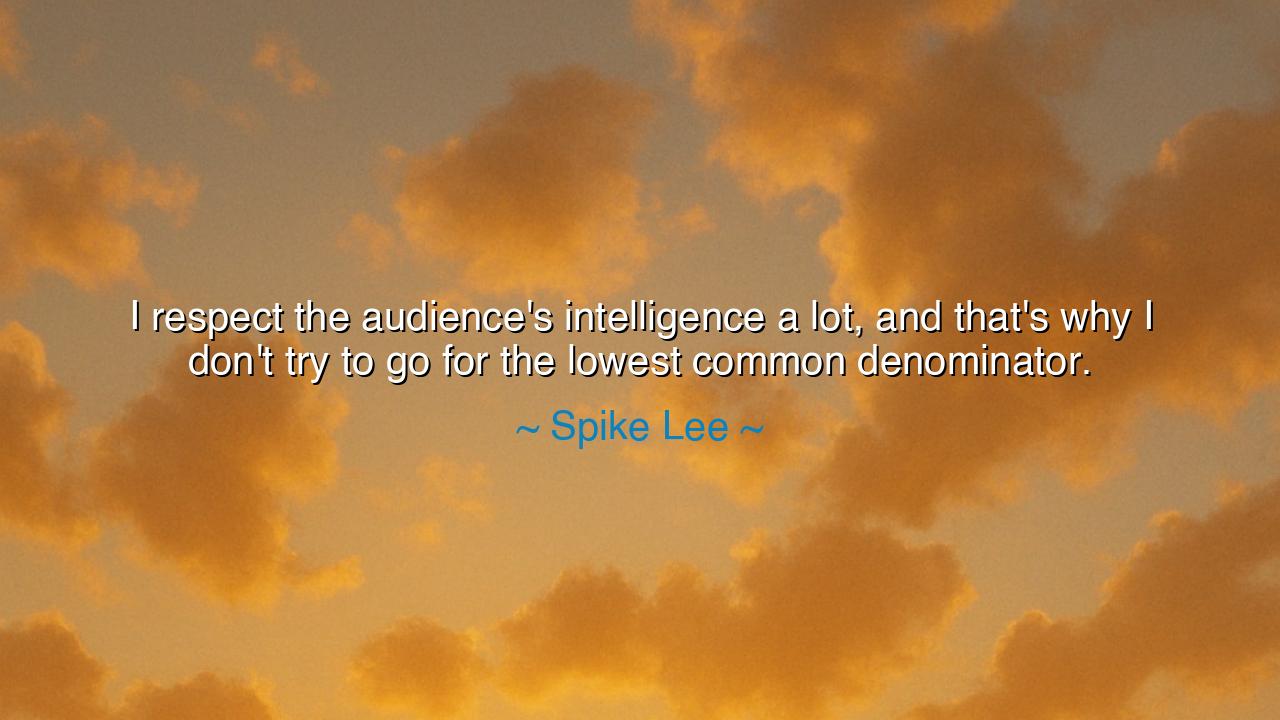
I respect the audience's intelligence a lot, and that's why I
I respect the audience's intelligence a lot, and that's why I don't try to go for the lowest common denominator.






Here is an ancient-style reflection on Spike Lee’s quote:
The Honor of Truth and the Wisdom of the Audience
When Spike Lee declared, “I respect the audience’s intelligence a lot, and that’s why I don’t try to go for the lowest common denominator,” he spoke not as a mere filmmaker, but as a guardian of truth and thought. His words ring like a bell through the ages — a call to every artist, teacher, and leader to honor the minds of those who listen. In them lies the essence of integrity: that to truly serve the people is not to flatter them with simplicity, but to challenge them with truth.
The meaning of his words rests upon the sacred bond between the creator and the audience. Too often, those who hold the power to communicate — through art, story, or speech — descend into mediocrity, seeking approval rather than enlightenment. They strip away depth for the comfort of ease, crafting messages that ask nothing of the listener but applause. Spike Lee rejects this compromise. He reminds us that to respect the audience is to believe in their capacity to think, to feel, to wrestle with complexity. The true artist does not guide his audience into slumber, but awakens them into awareness.
The origin of this conviction can be traced to Lee’s lifelong defiance of convention. From his earliest films, such as Do the Right Thing and Malcolm X, he refused to hide uncomfortable truths behind polished illusions. He demanded of his viewers not passive entertainment, but participation — a willingness to question society and themselves. His art calls upon the audience to be not consumers, but co-creators in understanding. In this way, his respect for intelligence becomes an act of faith — faith that people can rise to meet what is real, even when it is painful.
This wisdom is not new. In the days of ancient Athens, the playwright Sophocles wrote tragedies that forced citizens to confront the limits of power, fate, and justice. His works did not soothe; they provoked. And yet the people loved him, for he honored their capacity to think deeply. Likewise, the philosopher Socrates was condemned for asking too many questions, for refusing to give his fellow Athenians comforting answers. But he believed that the unexamined life was not worth living — that only through dialogue and discomfort could the soul grow. So too does Lee walk in this lineage: the lineage of those who trust the mind of the people, even when the truth stings.
There is a subtle heroism in this respect. To speak plainly yet profoundly, to tell the truth without compromise, is to believe in the divine spark within every listener. It is easy to charm the crowd with empty noise; it is difficult to elevate them with meaning. Yet only the latter endures. The false comfort of shallow art fades quickly, like smoke in the wind, but the work that demands thought remains, echoing in the heart long after the curtain falls.
And what of those who fear challenging their audience? They betray not only their art but their own soul. For the artist who lowers his standard to please the crowd soon forgets what truth feels like. The leader who panders to ignorance becomes enslaved by it. But the one who dares to speak honestly, even when misunderstood, sows the seeds of awakening in generations yet to come. Respect for intelligence is the foundation of all lasting influence.
Therefore, O seeker of truth, learn from this teaching: never condescend to those you serve. Whether you speak, teach, create, or lead, trust in the higher nature of those who listen. Offer them not the easy path of flattery, but the difficult road of insight. Believe that minds, like muscles, grow only when challenged.
For in the end, the greatness of a society is not measured by the comfort of its people, but by the courage of its thinkers — those who refuse to speak down to the world, and instead call the world upward. Spike Lee’s words remind us that truth, spoken with respect and passion, may not please everyone — but it will awaken those who are meant to hear it. And that, in every age, is the highest calling of the artist and the wise.






AAdministratorAdministrator
Welcome, honored guests. Please leave a comment, we will respond soon